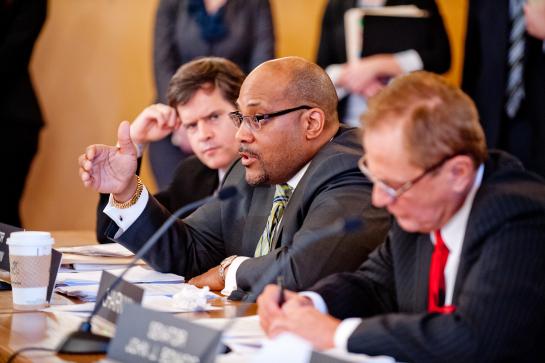Campaign Donations Missing From Sampson’s Records

The investigation into the affairs of State Senator John Sampson continues to broaden as new reports of shady behavior keeps bubbling to the surface. According to a report by the New York Post, the latest scandal involves three cases where campaign donations were found to be missing from Sampson’s records.
The missing donations, made by political action committees, spanned from 2009 to 2012. The first questionable instance occurred on July 17, 2009, when Lawpac, an organization run by the New York State Trial Lawyers Association, donated $3,000 to Sampson. Sampson’s records indicate that he only received $1,000 from the group even though the full check was cashed.
A similar occurrence happened on January 22, 2010. Sampson received $1,000 from the Educational Leadership PAC but Sampson reported that he only took in $500 from the organization. Again, the full check was cashed. The Post goes on to describe another mysterious instance of bad record keeping as well as a slew of mysterious refunds to PACs that are also not properly accounted for:
The Committee for Action for a Responsible Electorate PAC reported a contribution of $1,000 to Sampson’s campaign on Jan. 21, 2010. A spokesman for the PAC says the check was cashed for its full $1,000 amount on Feb. 2 2010. The cash does not show up on Sampson’s records, state campaign-finance records show.
In addition to the missing money, The Post found Sampson mysteriously refunded $11,450 in donations to at least eight PACs in 2010. However, the refunds do not show up as receipts in the campaign filings of the PACs, which include the Real Estate Board PAC, Uniformed Firefighters Association/FIREPAC and the Pharmacy PAC.
Mitch Alter, Sampson’s treasurer, blamed the missing cash on poor record keeping.
“What we’re talking about are small amounts. If mistakes were made, we’ll correct them. There’s nothing nefarious here,” Alter told the Post.
Mistake or not, Sampson’s alleged actions, which include a bribery scandal, threatening witnesses, missing charity money and charging business men retainer fees for Senatorial services, has led to a changes in judicial rules governing foreclosure suits, according to a another Post report
As a result of Sampson allegedly stealing $440,000 from foreclosure accounts that he was supposed to safeguard, the courts are now instituting a check that confirms that cash from foreclosure auctions is properly deposited with clerks.
“Because of the Sampson situation, we realized we had no way to check up if the referee was complying with the law,” Lawrence Knipel, the Brooklyn Supreme Court administrative judge for civil matters, told the Post. “We weren’t double-checking.”
The Post described how the new rule will prevent scams that people like Sampson allegedly partook in:
Civil judges assign attorneys, or “referees,” who are paid $500 to oversee the auction of a foreclosed property, pay off the mortgage and return any leftover money to the homeowner.
Until the recent reform, there wasn’t any mechanism that checked for excess money that should be returned to the homeowner, which allowed crooks to make off with the dough.
But now when the winning bid exceeds the amount owed on the house, the clerk will alert the judge and it will be the judge’s responsibility to check 60 days after the auction whether the money was properly deposited, Knipel said.
The new oversight rules have been in effect for over two weeks and will be expanded to all boroughs in the city in a short time.




